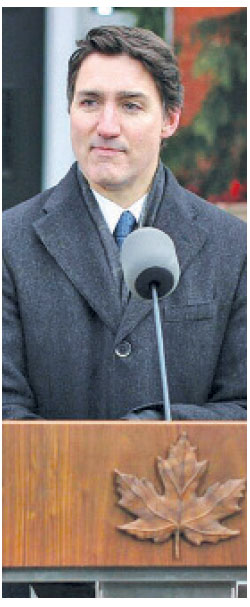From Sunny Ways to Uncertain Days
Canada in the Post-Trudeau Era
Morshed Noman
Published: 09 Jan 2025

Justin Trudeau’s resignation marks the conclusion of an era defined by ambition, idealism, and a fair share of controversy. After nearly a decade in power, the Canadian prime minister steps down under mounting political pressure and declining support, leaving behind a legacy that remains deeply polarising.
His tenure, once hailed as a symbol of progressive leadership, gradually became overshadowed by ethical scandals, unmet promises, and growing discontent both within his party and among the public. Trudeau’s departure does not merely signify the end of his leadership but highlights the broader challenges faced by centrist politics in an age of rising populism and deepening divides.
Trudeau’s decision to step down was driven by multiple factors. Rising dissatisfaction within his party, declining approval ratings, and increasing public discontent over issues such as inflation, cost of living, and unmet promises all played a role.
Ethical scandals, including the SNC-Lavalin affair and controversies surrounding luxury vacations, eroded trust in his leadership. The sudden resignation of his deputy, Chrystia Freeland, citing inadequate responses to trade threats from the Trump administration, further exacerbated internal tensions. Trudeau’s struggles to address immigration challenges and rising housing crises also contributed to his weakened position within the Liberal Party.

Trudeau’s resignation marks a significant shift in Canadian politics. It leaves a leadership vacuum in the Liberal Party, which now faces the challenge of selecting a new leader capable of restoring public trust and unifying the party. The political landscape is likely to see increased polarisation, with the Conservative Party under Pierre Poilievre poised to capitalise on the Liberals’ weakened standing. The balance of power in Canadian politics could shift towards more conservative governance, potentially altering the country's social and economic policies.
The next Canadian federal election will be heavily influenced by Trudeau's departure. The Liberal Party will need to present a compelling vision and a strong leader to counteract the Conservative momentum. Trudeau's resignation may energise Conservative supporters while leaving Liberal voters uncertain about their party's direction. Issues such as inflation, immigration, healthcare, and housing will dominate the election discourse. The outcome will depend largely on whether the Liberals can rally behind a capable successor and address the concerns that led to Trudeau's downfall.
Trudeau's economic initiatives, including child benefits and pandemic financial relief measures, might face scrutiny and potential rollbacks under a new government. The focus could shift towards austerity measures or policies prioritising business interests over social welfare. His progressive immigration policies, which emphasised humanitarian intake and inclusivity, might face significant changes under Conservative leadership.
Stricter immigration controls and prioritisation of economic migrants over refugees could become central themes. Canada’s stance on international issues, including its support for Ukraine, climate change initiatives, and advocacy for human rights, could undergo recalibration. A Conservative government might adopt a more pragmatic and trade-focused foreign policy, reducing emphasis on humanitarian diplomacy.
For Bangladesh, Trudeau's resignation might seem like a distant thunder, yet it carries the potential to subtly alter the fabric of its bilateral relations with Canada. Under Trudeau's leadership, Canada emerged as a compassionate voice for Rohingya refugees, a stance that resonated deeply in Dhaka's corridors of power.
A shift in Canadian leadership could recalibrate these diplomatic endeavours, introducing new dynamics in international support for Bangladesh's socio-political challenges. Trudeau's Canada has been a beacon for immigrants, and his policies are often viewed as the golden ticket for Bangladeshi professionals, students, and skilled labourers. A change in leadership could change this narrative as well.
The Conservatives, should they seize power, might tighten immigration policies, prioritising economic assimilation over humanitarian intake. This could stymie the flow of Bangladeshi immigrants, who have found in Canada not just a land of opportunity but a sanctuary amid global geopolitical unrest.
For Bangladesh, it signals the need to diversify its migration strategies and strengthen bilateral ties with other nations to mitigate the risks of a tighter Canadian immigration sieve. It may also prompt Dhaka to focus more on retaining talent domestically, investing in local opportunities to reduce the brain drain catalysed by the allure of foreign lands.
Trudeau's resignation is more than the end of a political era; it is a testament to the evolving nature of global politics where leadership, charisma, and policy intertwine in a dance dictated by the shifting winds of public opinion. Politics of one nation can often become the fortunes of another -- a lesson ever so poignant in the interconnected age we inhabit.
_________________________
The writer is a journalist.
He can be reached at [email protected]

